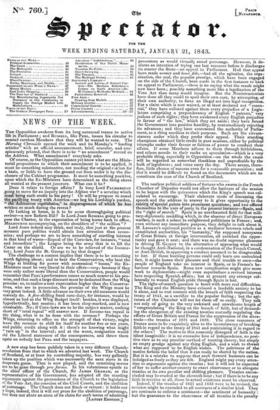A new step has been publicly taken in a very
different Church- revolution from that to which we adverted last week. The Church of Scotland, or at least its controlling majority, has very gallantly taken up the position which was necessarily the next move in its desperate game. That is now played, and the remaining moves are to be gone through pro forma. In his voluminous epistle to the chief officer of the Church, Sir JAMES GRAHAM, as the representative of his Government, has adopted all the standing arguments against the pretensions of the Church to the legislation of the Veto Act, the coercion of the Civil Courts, and the abolition of patronage. The Church does not flinch or retract : it holds out a hope, indeed, that it will not press for the abolition of patronage, but does not abate an atom of its claim for such terms of admitting presentees as would virtually annul patronage. However, it de- clares an intention of trying one last resource before it discharges its master the State—an appeal to Parliament. Had that appeal been made sooner and bond fide,—had all the agitation, the orga- nization, the zeal, the popular prestige, which have been engaged on the side of the Church, been made in the first instance to back an appeal to Parliament,—there is no saying what the result might now have been ; possibly something more like a legalization of the Veto Act than many would imagine. But the Nonintrusionists have done all they could to spoil their own case, by attempting, of their own authority, to force an illegal act into legal recognition. For a claim which is now waived, or at least declared not " essen- tial," they have enlisted against them every prejudice of a Legis- lature comprising a preponderancy of English " patrons," very Jealous of such rights; they have awakened every English prejudice in favour of " the law," which they set aside; they have forced the Government into positive hostility, by contumeliously rejecting its advances; and they have contemned the authority of Parlia- ment, as a thing needless to their purpose. Such are the circum- stances under which they prefer their appeal. Their standing champions obtained little credit in past sessions, either by political triumphs under their favour or fulness of power to conduct their affairs. If some Members adhere to them through faithfulness, and others accede to their ranks on speculation—which is a very probable thing, especially in Opposition—on the whole the cause will be regarded as somewhat thankless and unprofitable by the bulk of legislators ; and votes carry the day. There seems, there- fore, little chance of success even for a reasonable proposition ; and that it would be difficult to found on the documents which are to constitute the case of the Church of Scotland.


























